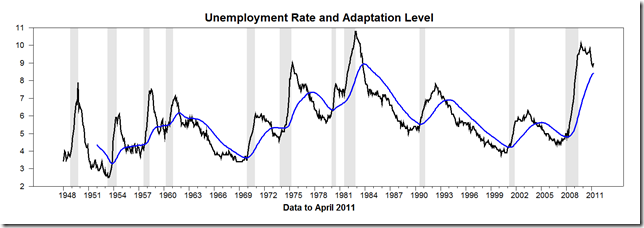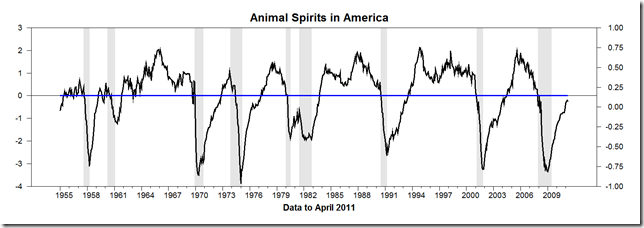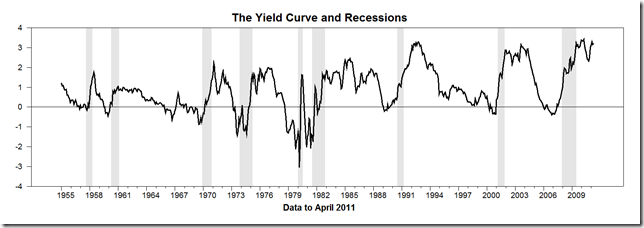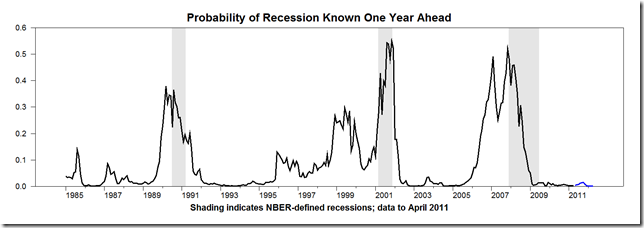“Animal spirits” or confidence levels of Americans have been depressed for several years now, but the surprising result of the approach taken here is that there is no collapse of “animal spirits”—which I take to be the salient aspect of a business slump—in sight.
Proceeding from the fundamentals of psychology, adaptation level theory, and the natural preoccupation of Americans with their employment status, given America’s “flexible” and not terribly labor-friendly labor markets, I argue that the primary driver of Americans’ confidence levels is the difference of the current employment rate and an adaptation level in memory from the past several years (with exponential weight declining into the past):
A = – (U – UMEAN)/std(U)
where A is “animal spirits,” U is the unemployment rate, UMEAN is an exponentially weighted moving average over the past 48 months, and std(U) is the standard deviation of the unemployment rate over 48 months.


Business slumps are generally marked by a sharp downward jag of the A indicator. There was a brief false positive in 1963 that lacked follow through, and a collapse from negative levels of A and confidence in the early ‘Eighties double dip recession, but otherwise the onset of a recession always has occurred in the past 50-plus years as A approached the zero line from above, crossed zero, and accelerated downward. This can be motivated by considering confidence as a form of psychological wealth, subject to steeper utility discount for losses than gains.
The adaptation level is now at 8.4, the actual unemployment rate at 9.0. If unemployment falls to about 8.5, and the adaptation level rises to 8.5, there will be a potential trigger effect to greater confidence. (I am simply following empirical history here, the assumption being that people still pay the most attention to the headline rate, even as numerous analysts blast away at it credibility, and the Labor Department’s own figures show that most the improvement in the headline rate in recent months has come from people leaving the labor force.)
There is persistence to social psychology. Currently, people desperately want to feel good. The Chinese call it yin and yang. You can’t feel bad forever. If the labor market cooperates and the Labor Department is able to publish a declining unemployment rate over the next several months, the business cycle may enter a phase of positive “animal spirits.”
I will guess that this will happen, for variety of reasons. It doesn’t mean the economy is healthy, it just means people’s psychology has changed, for however short a time.
The other reason to believe there is no pronounced slump in prospect (as distinguished from the economy persisting in a low-grade depression, as most Americans believe it to be doing) is that the yield curve is very steep. Now John Hussman has argued that in a ZIRP environment, the yield curve loses predictive power. He alleges that it did so in Japan during the ‘Nineties, and in the United States in the ‘Thirties. I use a 1-year rate rather than the 3-month T-rate with the 10-year T-bond rate to try to avoid this problem. The yield curve is very steeply sloped. Also, close examination of the Japanese data (here) shows that simply adjusting for ZIRP by looking at whether slope falls below about 1 percentage point is predictive; flattening of the yield curve still predicts. In the American case, if the 1/10 slope falls to less than about one, it’s also probably a safe bet a recession is coming. That would be the OK Corral for QEn.

Putting the “animal spirits” variable together with the yield curve in a logistic regression recession forecasting model using the slope of the yield curve and A from a year before produces a very accurate forecasting model that has forecast the last two recessions in real time well ahead of the clueless professional business economists (whose real job is cheerleading anyway).

The New York Fed yield curve model comes to the same conclusion.
Here is what I expect the social psychology of the next couple of years to be like: by hook or by crook the unemployment rate will decline to 8.5 within the next year. There will be an eerie, probably short-lived period of hope that our fiscal-monetary checkmate will be avoided. Remember, Richard Nixon was elected in 1972 and went on to be the most fiscally irresponsible president of the postwar period up till then (George W. Bush took the prize later). Nixon tried the methods of the Soviet Union—price controls, central planning—to get us out of the mess of guns and butter inflation. And of course he took us off the gold standard, creating the monster of Bretton Woods II that is now in the process of going super nova as fiat currencies around the world race toward worthlessness and the money changers salivate over the new bubbles to exploit popping up all around them.
So as in 1973, the collapse could come shortly after the next presidential election, in about 2013. America is set up for a great demand deflation, as 70 million baby boomers without sufficient assets to retire at a standard of living consistent with what they’ve had while working try to keep jobs in a stagnant American labor market that is employing the smallest fraction of the population in thirty years. The collapse could be delayed if America enters a world war and labor is conscripted, legislatively or morally, and—mirabile dictu—the distribution of income were to become more equal in a spirit of shared sacrifice as happened during World War II, after the last age of inequality and excess.


Source: Economix














